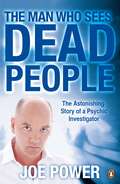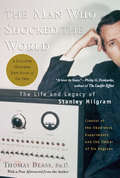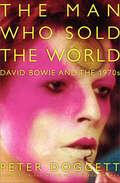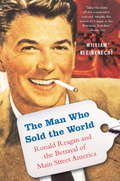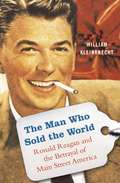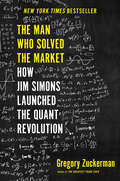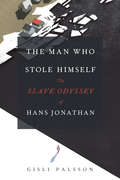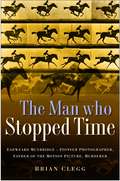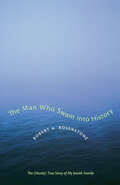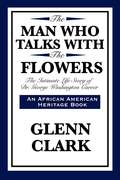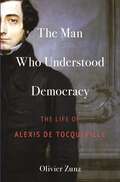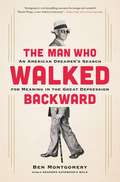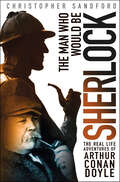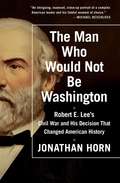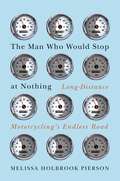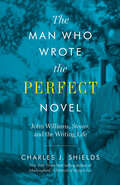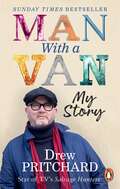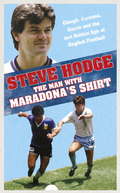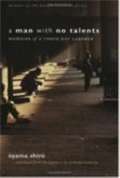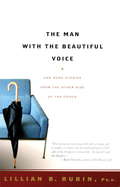- Table View
- List View
The Man Who Sees Dead People: The Astonishing Story Of A Psychic
by Joe PowerFor almost a decade, psychic medium Joe Power has used his extraordinary powers to investigate high-profile, unsolved crimes around the world, including, most recently, the disappearance of Madeleine McCann.But it wasn't always this way. Joe had denied his psychic abilities until the day his brother was found dead. Then messages from the spirit world led him to see the shocking truth behind the tragedy . . . his brother had been murdered.Joe realized he could no longer ignore the startling visions and voices in his head. He vowed to use his psychic gift to help solve the murder cases that were leaving detectives baffled, and loved ones without closure. In The Man Who Sees Dead People he tells the astonishing story of his life for the first time.
The Man Who Shocked The World: The Life and Legacy of Stanley Milgram
by Thomas BlassCreator of the famous Obedience Experiments and originator of the ?six degrees of separationOCO theory, Stanley Milgram transformed our understanding of human nature and continues to be one of the most important figures in psychology and beyond. In this sparkling biography, Thomas Blass captures the colorful personality and pioneering work of a visionary scientist who revealed the hidden workings of our social world. In this new paperback edition, he includes an afterword connecting MilgramOCOs theories to torture, war crimes, and Abu Ghraib. "
The Man Who Sold the World: David Bowie and the 1970s
by Peter DoggettThe Man Who Sold the World is a critical study of David Bowie's most inventive and influential decade, from his first hit, "Space Oddity," in 1969, to the release of the LP Scary Monsters (and Super Creeps) in 1980. Viewing the artist through the lens of his music and his many guises, the acclaimed journalist Peter Doggett offers a detailed analysis—musical, lyrical, conceptual, social—of every song Bowie wrote and recorded during that period, as well as a brilliant exploration of the development of a performer who profoundly affected popular music and the idea of stardom itself.Dissecting close to 250 songs, Doggett traces the major themes that inspired and shaped Bowie's career, from his flirtations with fascist imagery and infatuation with the occult to his pioneering creation of his alter-ego self in the character of Ziggy Stardust. What emerges is an illuminating account of how Bowie escaped his working-class London background to become a global phenomenon. The Man Who Sold the World lays bare the evolution of Bowie's various personas and unrivaled career of innovation as a musician, singer, composer, lyricist, actor, and conceptual artist. It is a fan's ultimate resource—the most rigorous and insightful assessment to date of Bowie's artistic achievement during this crucial period.
The Man Who Sold the World: Ronald Reagan and the Betrayal of Main Street America
by William KleinknechtSince Ronald Reagan left office-and particularly after his death-his shadow has loomed large over American politics: Republicans and many Democrats have waxed nostalgic, extolling the Republican tradition he embodied, the optimism he espoused, and his abilities as a communicator. This carefully calibrated image is complete fiction, argues award-winning journalist William Kleinknecht. The Reagan presidency was epoch shattering, but not-as his propagandists would have it-because it invigorated private enterprise or made America feel strong again. His real legacy was the dismantling of an eight-decade period of reform in which working people were given an unprecedented sway over our politics, our economy, and our culture. Reagan halted this almost overnight. In the tradition of Thomas Frank’s What’s the Matter with Kansas?, Kleinknecht explores middle America-starting with Reagan’s hometown of Dixon, Illinois-and shows that as the Reagan legend grows, his true legacy continues to decimate middle America.
The Man Who Sold the World: Ronald Reagan and the Betrayal of Main Street America
by William KleinknechtSince Ronald Reagan left office--and particularly after his death--his shadow has loomed large over American politics: Republicans and many Democrats have waxed nostalgic, extolling the Republican tradition he embodied, the optimism he espoused, and his abilities as a communicator. This carefully calibrated image is complete fiction, argues award-winning journalist William Kleinknecht. The Reagan presidency was epoch shattering, but not--as his propagandists would have it--because it invigorated private enterprise or made America feel strong again. His real legacy was the dismantling of an eight-decade period of reform in which working people were given an unprecedented sway over our politics, our economy, and our culture. Reagan halted this almost overnight.In the tradition of Thomas Frank's What's the Matter with Kansas?, Kleinknecht explores middle America--starting with Reagan's hometown of Dixon, Illinois--and shows that as the Reagan legend grows, his true legacy continues to decimate middle America.
The Man Who Solved the Market: How Jim Simons Launched the Quant Revolution
by Gregory ZuckermanGregory Zuckerman, the bestselling author of The Greatest Trade Ever and The Frackers, answers the question investors have been asking for decades: How did Jim Simons do it? <P><P>Shortlisted for the Financial Times/McKinsey Business Book of the Year AwardJim Simons is the greatest money maker in modern financial history. No other investor--Warren Buffett, Peter Lynch, Ray Dalio, Steve Cohen, or George Soros--can touch his record. <P><P>Since 1988, Renaissance's signature Medallion fund has generated average annual returns of 66 percent. The firm has earned profits of more than $100 billion; Simons is worth twenty-three billion dollars.Drawing on unprecedented access to Simons and dozens of current and former employees, Zuckerman, a veteran Wall Street Journal investigative reporter, tells the gripping story of how a world-class mathematician and former code breaker mastered the market. Simons pioneered a data-driven, algorithmic approach that's sweeping the world. <P><P>As Renaissance became a market force, its executives began influencing the world beyond finance. Simons became a major figure in scientific research, education, and liberal politics. Senior executive Robert Mercer is more responsible than anyone else for the Trump presidency, placing Steve Bannon in the campaign and funding Trump's victorious 2016 effort. <P><P>Mercer also impacted the campaign behind Brexit.The Man Who Solved the Market is a portrait of a modern-day Midas who remade markets in his own image, but failed to anticipate how his success would impact his firm and his country. It's also a story of what Simons's revolution means for the rest of us. <P><P><b>A New York Times Bestseller</b>
The Man Who Stole Himself: The Slave Odyssey of Hans Jonathan
by Gisli PalssonThe island nation of Iceland is known for many things--majestic landscapes, volcanic eruptions, distinctive seafood--but racial diversity is not one of them. So the little-known story of Hans Jonathan, a free black man who lived and raised a family in early nineteenth-century Iceland, is improbable and compelling, the stuff of novels. In The Man Who Stole Himself, Gisli Palsson lays out the story of Hans Jonathan (also known as Hans Jónatan) in stunning detail. Born into slavery in St. Croix in 1784, Hans was taken as a slave to Denmark, where he eventually enlisted in the navy and fought on behalf of the country in the 1801 Battle of Copenhagen. After the war, he declared himself a free man, believing that he was due freedom not only because of his patriotic service, but because while slavery remained legal in the colonies, it was outlawed in Denmark itself. He thus became the subject of one of the most notorious slavery cases in European history, which he lost. Then Hans ran away--never to be heard from in Denmark again, his fate unknown for more than two hundred years. It's now known that Hans fled to Iceland, where he became a merchant and peasant farmer, married, and raised two children. Today, he has become something of an Icelandic icon, claimed as a proud and daring ancestor both there and among his descendants in America. The Man Who Stole Himself brilliantly intertwines Hans Jonathan's adventurous travels with a portrait of the Danish slave trade, legal arguments over slavery, and the state of nineteenth-century race relations in the Northern Atlantic world. Throughout the book, Palsson traces themes of imperial dreams, colonialism, human rights, and globalization, which all come together in the life of a single, remarkable man. Hans literally led a life like no other. His is the story of a man who had the temerity--the courage--to steal himself.
The Man Who Stopped Time
by Brian CleggBrian Clegg tells the extraordinary story of the pioneer of photography, eccentric Victorian inventor Eadweard Muybridge. If most of us have seen Muybridge's distinctive stop-motion photographs, all of us have seen the fruit of his extraordinary technological innovation: today's cinema and television. But it is his personal life that possesses all the ingredients of a classic non-fiction best-seller: a passionately driven man struggling against the odds; dire treachery and shocking betrayal; a cast of larger-than-life characters set against a backdrop of San Francisco and the Far West in its most turbulent and dangerous era; a profusion of scientific and artistic advances and discoveries, one hotly following on another; the nervous intensity of two spectacular courtroom dramas (one pitting Muybridge against the richest man in the land and staring ruin in the face, the other sees him fighting for his life). And for the opening act, a foul murder on a dark and stormy night.
The Man Who Swam into History: The (Mostly) True Story of My Jewish Family (Jewish History, Life, and Culture)
by Robert A. RosenstoneThe story begins with a grandfather who heroically escaped from Russia by swimming the Pruth River to Romania--or did he? Then there are stories of another grandfather who kept a lifelong mistress; grandmothers who were ignored except in the kitchen; migrations legal and illegal from Eastern Europe to Canada to California; racketeers on one side of the family and Communists on the other; and a West Coast adolescence in the McCarthy years. All of these (mostly true) stories form a Jewish family's history, a tale of dislocation and assimilation. But in the hands of award-winning historian Robert Rosenstone, they become much more. The fragments of memory so beautifully preserved in The Man Who Swam into History add unforgettable, human characters to the now familiar story of the Jewish diaspora in the twentieth century.
The Man Who Talks With The Flowers
by Glenn ClarkDuring his life time George Washington Carver was referred to as the black Leonardo da Vinci. His research into alternative crops to replace cotton, such as peanuts, soybeans and sweet potatoes revolutionized Southern farming. Carver was born into slavery, once slavery was abolished Carver traveled expensively to study and educate himself. He was the first head of the Agricultural Department at the famous Tuskegee Institute. This book is a recollection of Glenn Clark on his close relationship with Carver.
The Man Who Understood Democracy: The Life of Alexis de Tocqueville
by Olivier ZunzA definitive biography of the French aristocrat who became one of democracy’s greatest championsIn 1831, at the age of twenty-five, Alexis de Tocqueville made his fateful journey to America, where he observed the thrilling reality of a functioning democracy. From that moment onward, the French aristocrat would dedicate his life as a writer and politician to ending despotism in his country and bringing it into a new age. In this authoritative and groundbreaking biography, leading Tocqueville expert Olivier Zunz tells the story of a radical thinker who, uniquely charged by the events of his time, both in America and France, used the world as a laboratory for his political ideas.Placing Tocqueville’s dedication to achieving a new kind of democracy at the center of his life and work, Zunz traces Tocqueville’s evolution into a passionate student and practitioner of liberal politics across a trove of correspondence with intellectuals, politicians, constituents, family members, and friends. While taking seriously Tocqueville’s attempts to apply the lessons of Democracy in America to French politics, Zunz shows that the United States, and not only France, remained central to Tocqueville’s thought and actions throughout his life. In his final years, with France gripped by an authoritarian regime and America divided by slavery, Tocqueville feared that the democratic experiment might be failing. Yet his passion for democracy never weakened.Giving equal attention to the French and American sources of Tocqueville’s unique blend of political philosophy and political action, The Man Who Understood Democracy offers the richest, most nuanced portrait yet of a man who, born between the worlds of aristocracy and democracy, fought tirelessly for the only system that he believed could provide both liberty and equality.
The Man Who Walked Backward: An American Dreamer's Search for Meaning in the Great Depression
by Ben MontgomeryFrom Pulitzer Prize finalist Ben Montgomery, the story of a Texas man who, during the Great Depression, walked around the world -- backwards. Like most Americans at the time, Plennie Wingo was hit hard by the effects of the Great Depression. When the bank foreclosed on his small restaurant in Abilene, he found himself suddenly penniless with nowhere left to turn. After months of struggling to feed his family on wages he earned digging ditches in the Texas sun, Plennie decided it was time to do something extraordinary -- something to resurrect the spirit of adventure and optimism he felt he'd lost. He decided to walk around the world -- backwards. In The Man Who Walked Backward, Pulitzer Prize finalist Ben Montgomery charts Plennie's backwards trek across the America that gave rise to Woody Guthrie, John Steinbeck, and the New Deal. With the Dust Bowl and Great Depression as a backdrop, Montgomery follows Plennie across the Atlantic through Germany, Turkey, and beyond, and details the daring physical feats, grueling hardships, comical misadventures, and hostile foreign police he encountered along the way. A remarkable and quirky slice of Americana, The Man Who Walked Backward paints a rich and vibrant portrait of a jaw-dropping period of history.
The Man Who Went to the Far Side of the Moon: The Story of Apollo 11 Astronaut Michael Collins
by Bea Uusma Schyffert Emi GunerMichael Collins is one of the few men who has ever seen the far side of the moon. In this book, you will see the notes he wrote while flying in space, the special things he brought, and even what he ate for breakfast.
The Man Who Went to War: A Reporter's Memoir from Libya and the Arab Uprising
by Patrick GrahamAlmost a decade since deciding to give up war reporting full-time, and at the unexpected prodding of his wife, award-winning journalist Patrick Graham travels to the heart of the Libyan Revolution and the Arab Spring. He delivers a story by turns harrowing and comic, rich in both dramatic, on-the-ground reportage and historical detail, of a nation on the brink of transformation. “If you’re a recovering journalist listening to reports of a distant war on the radio, then you know, with the kind of arrogant certainty that sometimes irritates your wife, what you would be doing during these moments because you’re already there in your head. . . . I may have been at home in my kitchen wearing an apron, but my avatar had been doing some heroic work around the globe. Which is why I found myself mocking the guy on the radio: “For fuck’s sake, at least get to Benghazi!” It was around that time that my wife, who had walked in unnoticed, said, “Why don’t you go?” Within a few days of his wife’s suggestion, Graham was on a plane. It had been a while since he had last reported on a war. Though he lacked the security or credentials of a formal assignment, and was more than a little out of practice, he improvised his way from Egypt, then experiencing its own Arab Spring upheavals, and across the frontier into Libya. The result is an intimate eyewitness account – equal parts harrowing and hilarious – of the Libyan revolution as seen from the heart of the uprising in Benghazi. As ragtag militias try to beat back the assaults of Gaddafi’s troops, Graham introduces us to Libyan civilians with haunted pasts and uncertain futures, each of whom must decide whether they, too, will go to war. Meanwhile, Graham encounters both old colleagues and rookie journalists, forcing him to ask questions about the changing nature of war reportage in the age of social media. With a fascinating detour that explores the rebellion’s intellectual and spiritual roots in the Sanusi, a Sufi Muslim political order, The Man Who Went to War is a penetrating and engrossing story of a country on the brink of transformation.
The Man Who Would Be President: Dan Quayle
by David S. Broder Bob WoodwardAn assessment widely credited at the time.
The Man Who Would Be Sherlock: The Real Life Adventures of Arthur Conan Doyle
by Christopher SandfordA world-famous biographer reveals the strange relationship between Sir Arthur Conan Doyle's real life and that of Sherlock Holmes in the engrossing The Man Who Would Be Sherlock.Though best known for the fictional cases of his creation Sherlock Holmes, Conan Doyle was involved in dozens of real life cases, solving many, and zealously campaigning for justice in all. Stanford thoroughly and convincingly makes the case that the details of the many events Doyle was involved in, and caricatures of those involved, would provide Conan Doyle the fodder for many of the adventures of the violin-playing detective. There can be few (if any) literary creations who have found such a consistent yet evolving independent life as Holmes. He is a paradigm that can be endlessly changed yet always maintains an underlying consistent identity, both drug addict and perfect example of the analytic mind, and as Christopher Sandford demonstrates so clearly, in many of these respects he mirrors his creator.
The Man Who Would Not Be Washington: Robert E. Lee's Civil War and His Decision That Changed American History
by Jonathan HornThe “compelling…modern and readable perpective” (USA TODAY) of Robert E. Lee, the brilliant soldier bound by marriage to George Washington’s family but turned by war against Washington’s crowning achievement, the Union.On the eve of the Civil War, one soldier embodied the legacy of George Washington and the hopes of leaders across a divided land. Both North and South knew Robert E. Lee as the son of Washington’s most famous eulogist and the son-in-law of Washington’s adopted child. Each side sought his service for high command. Lee could choose only one.In The Man Who Would Not Be Washington, former White House speechwriter Jonathan Horn reveals how the officer most associated with Washington went to war against the union that Washington had forged. This extensively researched and gracefully written biography follows Lee through married life, military glory, and misfortune. The story that emerges is more complicated, more tragic, and more illuminating than the familiar tale. More complicated because the unresolved question of slavery—the driver of disunion—was among the personal legacies that Lee inherited from Washington. More tragic because the Civil War destroyed the people and places connecting Lee to Washington in agonizing and astonishing ways. More illuminating because the battle for Washington’s legacy shaped the nation that America is today. As Washington was the man who would not be king, Lee was the man who would not be Washington. The choice was Lee’s. The story is America’s.A must-read for those passionate about history, The Man Who Would Not Be Washington introduces Jonathan Horn as a masterly voice in the field.
The Man Who Would Stop at Nothing: Long-Distance Motorcycling's Endless Road
by Melissa Holbrook Pierson"Pierson is an even better writer than she is a rider."--Boston Globe "World's Toughest Motorcycle Riders"--long-distance motorcycling is not a pastime but an obsession. In this candid, eloquent, sharply observed book, Melissa Holbrook Pierson introduces us to this strange endeavor and the men and women who live to ride impossibly long distances, eating up road, almost without cease. And who find it nothing but fun. Perhaps the most determined of them is John Ryan, a magnetic, enigmatic man who loves nothing better than breaking records of amazing distance--at no small risk to himself and his health. But why? Pierson, who rediscovered the joys of motorcycling in the midst of a personal crisis, puts on her helmet and joins Ryan in his element in order to understand his singular desire and discipline, his passion and his obsession. The Man Who Would Stop at Nothing offers an intimate glimpse of an unusually independent yet supportive community as well as a revealing, unforgettable portrait of its most daring member. In electric, pitch-perfect prose, Pierson gives us rare insights into not only a subculture but also the deeply human craving for something more that drives it.
The Man Who Wrote the Perfect Novel: John Williams, Stoner, and the Writing Life
by Charles J. ShieldsAn &“engrossing&” biography of a brilliant novelist underappreciated in his own time who became a twenty-first-century bestseller, from the New York Times–bestselling author (The New Yorker). When Stoner was published in 1965, the novel sold only a couple of thousand copies before disappearing with hardly a trace. Yet the quietly powerful tale of Midwestern college professor William Stoner, whose life becomes a parable of solitude and anguish, eventually found an admiring audience in America and especially in Europe. The New York Times called Stoner &“a perfect novel,&” and a host of writers and critics, including Colum McCann, Julian Barnes, Bret Easton Ellis, Ian McEwan, Emma Straub, Ruth Rendell, C.P. Snow, and Irving Howe, praised its artistry. The New Yorker deemed it &“a masterly portrait of a truly virtuous and dedicated man.&” This biography traces the life of Stoner&’s author, John Williams. Charles J. Shields follows the whole arc of Williams&’s life, which in many ways paralleled that of his titular character, from their shared working-class backgrounds to their undistinguished careers in academia. Shields vividly recounts Williams&’s development as an author, whose other works include the novels Butcher&’s Crossing and Augustus (for the latter, Williams shared the 1972 National Book Award). Shields also reveals the astonishing afterlife of Stoner, which garnered new fans with each American reissue, and then became a bestseller all over Europe after a Dutch publisher brought out a translation in 2013. Since then, Stoner has been published in twenty-one countries and sold over a million copies. &“Like Williams, Shields know how to tell a good story, one that will appeal especially to those interested in the ins and outs of the publishing industry and the ups and downs of a writer&’s life.&” —Los Angeles Review of Books
The Man Who Wrote the Perfect Novel: John Williams, Stoner, and the Writing Life
by Charles J. ShieldsAn &“engrossing&” biography of a brilliant novelist underappreciated in his own time who became a twenty-first-century bestseller, from the New York Times–bestselling author (The New Yorker). When Stoner was published in 1965, the novel sold only a couple of thousand copies before disappearing with hardly a trace. Yet the quietly powerful tale of Midwestern college professor William Stoner, whose life becomes a parable of solitude and anguish, eventually found an admiring audience in America and especially in Europe. The New York Times called Stoner &“a perfect novel,&” and a host of writers and critics, including Colum McCann, Julian Barnes, Bret Easton Ellis, Ian McEwan, Emma Straub, Ruth Rendell, C.P. Snow, and Irving Howe, praised its artistry. The New Yorker deemed it &“a masterly portrait of a truly virtuous and dedicated man.&” This biography traces the life of Stoner&’s author, John Williams. Charles J. Shields follows the whole arc of Williams&’s life, which in many ways paralleled that of his titular character, from their shared working-class backgrounds to their undistinguished careers in academia. Shields vividly recounts Williams&’s development as an author, whose other works include the novels Butcher&’s Crossing and Augustus (for the latter, Williams shared the 1972 National Book Award). Shields also reveals the astonishing afterlife of Stoner, which garnered new fans with each American reissue, and then became a bestseller all over Europe after a Dutch publisher brought out a translation in 2013. Since then, Stoner has been published in twenty-one countries and sold over a million copies. &“Like Williams, Shields know how to tell a good story, one that will appeal especially to those interested in the ins and outs of the publishing industry and the ups and downs of a writer&’s life.&” —Los Angeles Review of Books
Man with a Van: My Story
by Drew PritchardSunday Times bestseller'When I see something old, that I think is beautiful, special, valuable, it's not about the money. It's about being in another time and place.'Star of TV's Salvage Hunters, Drew Pritchard will go to the greatest lengths for the best deals. He discovered the casts Lord Elgin made of his infamous marbles in a school garage, and broke the bank to buy the tool box Malcolm Campbell used when he set the water speed record in 1934. He made a million. Lost it. And made it again.The face of the compulsively fascinating business of finding and restoring lost treasures, visionary Drew takes us up and down the country, into garages, factories, schools and pubs, digging out incredible items from that 'other time and place'. Then by lovingly restoring them, he brings our history back to life.A flat cap among silver spoons and old school ties, our favourite no-bullshit expert may be a one-off, but his story makes us all dream of that obscure piece of antiquity gathering dust in the garden shed...
The Man With Maradona's Shirt
by Steve HodgeIntimate, behind-the-scenes account of the last age of innocence in football, just prior to the Premiership, based on the England midfielder's diaries.This is not a straightforward autobiography, it's a snapshot of a vanished era of football. The 1980s and the early 1990s was the last era of (relative) innocence in football. Steve Hodge played alongside Hoddle, Waddle and Ardiles in the lauded mid-1980s Spurs midfield; he was a dressing-room witness to the vagaries, charm, whims and downright venomous side of Brian Clough; he was at two World Cups, being instrumental in the 'hand of God' episode, and hanging out with the likes of Gazza and Lineker four years later in Italy. He won the last League Championship medal with Leeds, then languished in the reserves with a 'somewhat shy', cultured Frenchman. As the balls would fly over the midfield - Howard Wilkinson being a disciple of route one - Eric Cantona would turn to him and repeatedly ask, 'Hodgey, why are we here?' THE MAN WITH MARADONA'S SHIRT is a fascinating, behind-the-scenes glimpse of life at the top.
The Man With Maradona's Shirt
by Steve HodgeIntimate, behind-the-scenes account of the last age of innocence in football, just prior to the Premiership, based on the England midfielder's diaries.This is not a straightforward autobiography, it's a snapshot of a vanished era of football. The 1980s and the early 1990s was the last era of (relative) innocence in football. Steve Hodge played alongside Hoddle, Waddle and Ardiles in the lauded mid-1980s Spurs midfield; he was a dressing-room witness to the vagaries, charm, whims and downright venomous side of Brian Clough; he was at two World Cups, being instrumental in the 'hand of God' episode, and hanging out with the likes of Gazza and Lineker four years later in Italy. He won the last League Championship medal with Leeds, then languished in the reserves with a 'somewhat shy', cultured Frenchman. As the balls would fly over the midfield - Howard Wilkinson being a disciple of route one - Eric Cantona would turn to him and repeatedly ask, 'Hodgey, why are we here?' THE MAN WITH MARADONA'S SHIRT is a fascinating, behind-the-scenes glimpse of life at the top.
A Man With No Talents: Memoirs Of A Tokyo Day Laborer
by Oyama Shiro Edward FowlerSan'ya, Tokyo's largest day-laborer quarter and the only one with lodgings, had been Oyama Shiro's home for twelve years when he took up his pen and began writing about his life as a resident of Tokyo's most notorious neighborhood. After completing a university education, Oyama entered the business workforce and appeared destined to walk the same path as many a "salaryman." A singular temperament and a deep loathing of conformity, however, altered his career trajectory dramatically. Oyama left his job and moved to Osaka, where he lived for three years. Later he returned to the corporate world but fell out of it again, this time for good. After spending a short time on the streets around Shinjuku, home to Tokyo's bustling entertainment district, he moved to San'ya in 1987, at the age of forty. <p><p> Oyama acknowledges his eccentricity and his inability to adapt to corporate life. Spectacularly unsuccessful as a salaryman yet uncomfortable in his new surroundings, he portrays himself as an outsider both from mainstream society and from his adopted home. It is precisely this outsider stance, however, at once dispassionate yet deeply engaged, that caught the eye of Japanese readers. <p> The book was published in Japan in 2000 after Oyama had submitted his manuscript--on a lark, he confesses--for one of Japan's top literary awards, the Kaiko Takeshi Prize. Although he was astounded actually to win the award, Oyama remained in character and elected to preserve the anonymity that has freed him from all social bonds and obligations. The Cornell edition contains a new afterword by Oyama regarding his career since his inadvertent brush with fame.
The Man with the Beautiful Voice
by Lillian RubinBeautifully crafted stories of psychotherapy-told for the first time from the perspective of the therapistIn her long career as a psychotherapist, acclaimed author Lillian Rubin occasionally encountered patients who demanded a very special, even unorthodox, therapeutic approach. For the first time, Dr. Rubin tells the stories of her most fascinating, most challenging case,'from the other side of the couch,' focusing not just on the patient, but on her own inner process as she confronts the issues each case raises. Each of the seven stories she tells is a moving journey into the human psyche, from the secret life of'The Woman Who Wasn't' or the extreme regression of'The White Hat' to the smoldering rage of'The Man with the Beautiful Voice.' Through these captivating tales, and in a thought-provoking introduction, Dr. Rubin illuminates the process of therapy and how it works, especially when rules need to be bent or even broken. For anyone who has been in therapy, or even wondered what happens behind those tightly sealed doors, this book offers a gift of insight.
